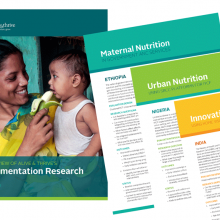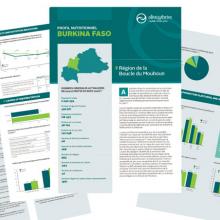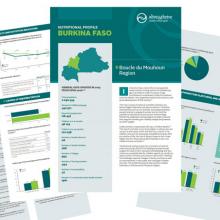Brief, Handout
Oct 28 2020

An overview of Alive & Thrive's implementation research
Alive & Thrive's implementation research spans its program areas, seeking to answer "how" to implement effective interventions and policies. Active studies are detailed in the attached documents.
Journal article
Jul 16 2020

Supply-and demand-side factors influencing utilization of infant and young child feeding counselling services in Viet Nam
Paired with improved counseling skills, demand-generation strategies could increase the population accessing the minimum number of visits to counseling services by 49%, according to this paper that investigated demand-generation strategies and supply-side factors influencing the utilization of fa
Handout
Apr 21 2020

Profils nutritionnels de six régions du Burkina Faso
Handout
Apr 21 2020

Burkina Faso Nutrition Profiles for Six Regions
These nutrition profiles present MIYCN data for six regions of Burkina Faso, including data on health and nutrition indicators, causes of undernutrition, nutrition promotion platforms and antenatal and child health care, and global nutrition targets.
Journal article
Feb 25 2020

Different combinations of behavior change interventions and frequencies of interpersonal contacts are associated with infant and young child feeding practices in Bangladesh, Ethiopia, and Viet Nam (Kim, S., 2019. Current Developments in Nutrition)
This article demonstrates that exposure to interventions matters for impact, but the combination of behavior change interventions and number of interpersonal counseling contacts required to support behavior change in infant and young child feeding are context-specific.
Journal article
Feb 25 2020

Nutrition intervention using behavioral change communication without additional material inputs increased expenditures on key food groups in Bangladesh (Warren AM., 2020. Journal of Nutrition)
This article demonstrated that recipients in the Phase I intensive intervention, which provided interpersonal counseling, community mobilization, and mass media campaigns, mobilized additional resources to improve diets.

